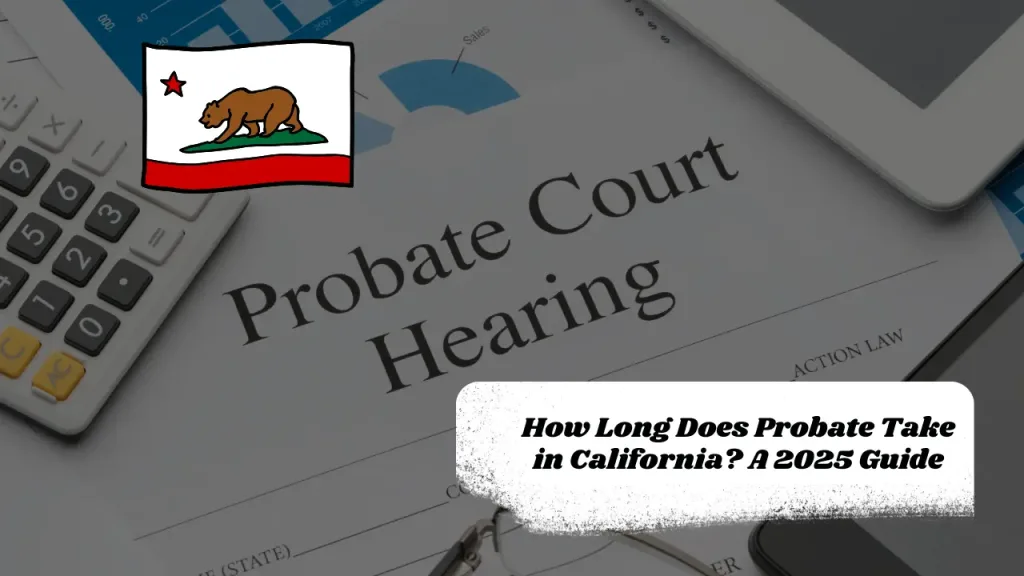How Long Does Probate Take in California? A 2025 Guide
How long does probate take in California? On average, probate takes 9–18 months for simple estates, but complex cases can stretch to 2–3 years or more. Delays often occur due to court backlogs, creditor claims, or family disputes. In this guide, we’ll break down the timeline, explain what influences it, and share tips to speed up the process.
What Is Probate, and Why Does It Take So Long?
Probate is the legal process of settling a deceased person’s estate, including validating their will, paying debts, and distributing assets. In California, probate is known for being slow because of strict court oversight, mandatory waiting periods, and the need to resolve all creditor claims and tax issues.
Average Probate Timeline in California
Here’s a step-by-step breakdown of how long each stage typically takes:
1. Filing the Petition (1–3 months)
- The executor files the will and death certificate with the court.
- Notices are published in local newspapers, and beneficiaries are notified.
2. Appointing the Executor (1–2 months)
- The court holds a hearing to validate the will and officially appoint the executor.
3. Inventory and Appraisal (4 months)
- The executor identifies and appraises all assets, such as real estate, bank accounts, and personal property.
4. Creditor Notification (4 months)
- Creditors have 4 months to file claims against the estate.
5. Debt and Tax Payments (6–12 months)
- The executor pays off debts, taxes, and administrative fees.
6. Final Distribution and Closing (12–18 months)
- The executor files a petition to distribute assets to beneficiaries.
- The court must approve the final distribution before closing the estate.
Related article for you:
What to Do When a Sibling Refuses to Sign Probate Documents? A Step-by-Step Guide

What Factors Can Extend the Timeline?
1. Estate Complexity
- Large estates with multiple properties, businesses, or hard-to-value assets (e.g., art, antiques) take longer to appraise and sell.
- Out-of-state assets add logistical challenges.
2. Family Disputes or Will Contests
- Challenges to the will’s validity or disagreements among beneficiaries can delay probate for months or even years.
3. Creditor Claims and Taxes
- Resolving creditor claims and filing federal tax returns can add 6–8 months to the process.
4. Court Backlogs
- Urban counties like Los Angeles or San Francisco often face delays due to high caseloads.
How to Speed Up Probate in California
Here are some practical tips to make the process faster:
1. Organize Early
- Gather all financial records, deeds, and beneficiary details before starting probate.
2. Use Simplified Procedures
- Estates worth $184,500 or less (as of 2025) can avoid full probate by using a Small Estate Affidavit.
3. Avoid Disputes
- Mediate family conflicts early or use a living trust to bypass probate entirely.
4. Hire Professionals
- A probate attorney can help navigate legal hurdles and streamline the process.
3 Key FAQs About California Probate
1. Can You Avoid Probate in California?
Yes! Jointly owned assets, living trusts, and accounts with beneficiary designations (e.g., life insurance) bypass probate.
2. Is a Lawyer Required for Probate?
No, but hiring a probate attorney is highly recommended, especially for complex estates or contested cases.
3. What Happens If There’s No Will?
The court distributes assets under California’s intestate laws, prioritizing spouses, children, and close relatives. This often adds 6–12 months to the timeline.
Need Help with California Probate?
If you’re feeling overwhelmed, these resources can help:
- The Probate Guy: Specializes in expediting probate with no upfront fees.
- Empathy: Offers step-by-step guidance for executors.
Pro Tip: Start probate within 30–90 days of death to prevent asset depreciation or creditor issues.
Final Thoughts
While probate in California can be time-consuming, understanding the process and planning ahead can make it more manageable. By organizing documents early, avoiding disputes, and seeking professional help, you can reduce delays and ensure a smoother experience.
Remember, probate doesn’t have to be a headache. With the right approach, you can navigate it efficiently and protect your loved ones’ future.
About the Author

Sarah Klein, JD, is an experienced estate planning attorney who has helped clients with wills, trusts, powers of attorney, and probate matters. At All About Lawyer, she simplifies complex estate laws so families can protect their assets, plan ahead, and avoid legal headaches during life’s most sensitive moments.
Read more about Sarah

My husband’s father’s estate has been in probate going on 12 years. Father left no will of any kind. He left 2
Properties right next to each other that was historical to the city. He didn’t pay taxes on it so he owed the city taxes. Because of the
Building on the property was a historical building it was very difficult to sale. No buyer wanted to deal with all the requirement of a historic building. Finally after several years someone bought the property. Sale from one of the property paid for the taxes owed to the city. During Year 11 state wrote a check to my husband & he had to give to the estate lawyer. My husband is the executor of the estate.
It is going on 12 years now & we still have not seen the money. There are 6 grandchildren & 4 living children the money has to be distributed. Original family there were 12 children but 5 died before the father, 2 died during the probate & 4 are still living. There are 6 living grand children.